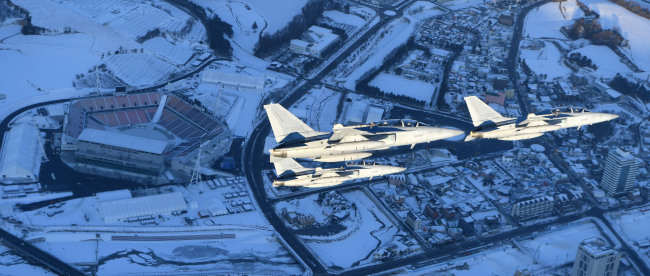North Korea could send a delegation to the upcoming PyeongChang Olympics to be held in South Korea and is open to talks with Seoul over it, the North's leader said in his New Year's speech Monday.
But Kim Jong-un also made it clear that his country will not give up its nuclear and missile programs, saying that a "nuclear button" is always placed on his desk.
"The Winter Games to be held in South Korea will be a good occasion for the country. We sincerely hope that the Winter Olympics will be a success," Kim said in his speech broadcast by the state-run TV station.
"We are ready to take various steps, including the dispatch of the delegation. To this end, the two Koreas can immediately meet," he said.

Kim's message came as a surprise as Seoul is pinning hopes on the North's participation in the games because the South believes that the move could help ease tensions on the Korean Peninsula.
It marked the first expression of North Korea's intent to attend the Winter Olympics, which will be held in PyeongChang, 180 kilometers east of Seoul, from Feb. 9-25. The Paralympics will be held from March 9-18.
Pyongyang missed an October deadline to confirm whether it would send its figure skating pairs team, but the doors are still open for North Korea, as the International Olympic Committee may grant select North Korean athletes wild-card entries.
Kim's conciliatory message is likely to lend support to President Moon Jae-in who hopes to see more engagement with North Korea.
South Korea proposed in July to have inter-Korean talks on easing military tensions and holding reunions of war-torn families, but the North has kept mum toward the offer.
Hoping to elicit the North's participation, Moon proposed to the United States to delay their joint annual military drills that could coincide with the games. The North has long denounced the exercises as a war rehearsal and used it as an excuse for its provocations.
"This year marks the 70th anniversary of the North Korean regime's establishment, and the South will host the Winter Games.
This year holds significance for the two Koreas," Kim said.
In contrast to his soft tone toward Seoul, the North's ruler warned that the US cannot go against Pyongyang as it has a strong nuclear deterrence against it.
"The US should be aware that the North's nuclear force is a reality, not a threat," Kim said.
"We need to mass-produce nuclear warheads and ballistic missiles, and accelerate their deployment. We should always keep readiness to take immediate nuclear counterattacks against the enemy's scheme for a nuclear war," he added.
North Korea intensified its provocative acts last year in defiance of international condemnation. It conducted its sixth and most powerful nuclear test in September and launched three intercontinental ballistic missiles (ICBMs).
North Korea announced the completion of nuclear armament after firing a new Hwasong-15 ICBM in November, which it says puts the whole US mainland within range.
Tensions between the US and North Korea heightened last year as US President Donald Trump and Kim traded bellicose rhetoric and personal insults.
The US has said that all options, including military action, are on the table though it prefers diplomacy to resolve North Korea's nuclear issue. Pyongyang has stressed that it will not put its nuclear weapons on the negotiation table.
The North is facing difficulty in navigating a way amid deepening international sanctions over its nuke and missile programs.
The United Nations Security Council has slapped a series of tough sanctions on Pyongyang, including the latest ones aimed at slashing refined petroleum product exports to North Korea by 89 percent. Analysts say that the sanctions are likely to bite the North beginning this year.
Experts said that the North seems to seek to improve inter-Korean ties to break the current stalemate in the face of stringent sanctions.
"North Korea appears to opt to seek better relations with the South for the goal of normalizing ties with the US," said Kim Hyun-wook, a professor at the Korea National Diplomatic Academy.
"The US could not take issue with inter-Korean talks over the Olympics."
Cheong Seong-chang, a senior research fellow at the Sejong Institute, said that the North is expected to sharpen its nuclear and missile technology as Kim ordered the mass-production and deployment of weapons.
"South Korea will have to deeply think about how to balance the resolution of nuclear issues and an improvement of relations between the two Koreas," he said. (Yonhap)





![[Graphic News] More Koreans say they plan long-distance trips this year](http://res.heraldm.com/phpwas/restmb_idxmake.php?idx=645&simg=/content/image/2024/04/17/20240417050828_0.gif&u=)